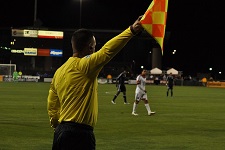Hitta dina biljetter
OUR ADVANTAGES






Football Penalties and Misconduct

Running Afoul in Football
Fouls are a grey area to the casual viewer when it comes to international football. Oftentimes they are at the referee's discretion, and it can be difficult to ascertain what the literal offense was. The following is a basic overview on a litany of common fouls and the punishments that follow them.
An important note before we begin is that all fouls aren't created equal. Some fouls will only result in free kick. Others will result in a yellow card. Much like a traffic light, yellow means caution, warning the player to clean up their play for the remainder of the game. The most severe fouls receive a red card. This banishes the player from the rest of the game and forces his side to play a man down for the remainder of the match.
Where a foul is committed is also important. If it occurs in the 18-yard box around the goal, that is a penalty and will result in a free kick on goal from the penalty spot. Penalties change the course of a game whenever they are awarded.
The most common fouls occur when a defender is trying to win the ball away from an attacking player. The standard rule of thumb for whether a tackle is worthy of a foul is whether the ball was won before contact was made with the player. Following through on a successful challenge is generally deemed acceptable. However, if the player misses the ball or times their challenge late, a foul will likely be called.
The most severely mistimed tackles can result in a straight red card. These are tackles that have no chance to win the ball and put the opposing player in grave danger. In England, Lee Cattlemole has earned a reputation for dangerous, reckless tackling. Whenever Cattlemole leaves his feet, supporting fans feel their heart skip a beat knowing that he is liable to put the studs of his boot square into his opposing marker's leg without cause or concern.
Handball is another very common offense. It's common knowledge that only the goalie is allowed to handle the ball with his hands. If a player is deemed to have played the ball off of his hand, it's deemed a foul, though it typically does not come with a card unless it is very deliberate. Luis Suarez gained a level of infamy in the international community when he deliberately handled a surefire goal when his Uruguay side was playing Ghana in the World Cup. Ghana proceeded to miss the penalty, and Uruguay won on the strength of Suarez's deliberate cheating.
Sometimes, a player will be facing a clear goalscoring opportunity where he has only the goalie to beat and an opposing defender will come from behind and intentionally foul the attacker in order to prevent the one-on-one. This is referred to as a "professional foul" and is a straight red, although the intent is such that it is typically forgiven by the defending side and their supporters.
Red cards are also given out when a player is simply vicious and cruel. Real Madrid defender Pepe has a reputation for trying to hurt people. In one famous instance (that was missed by the referee) Pepe deliberating stomped on Barcelona superstar Lionel Messi's hand, driving his metal spikes into his hand, which could have potentially mangled it. The aforementioned Suarez has also gotten in to hot water for literally biting people on three separate occasions.
Football is a beautiful game with an ugly side. Now you'll be able to spot it from your armchair, even if the ref doesn't.
(Photo via BayAreaBlas)
Populära sökningar












































































